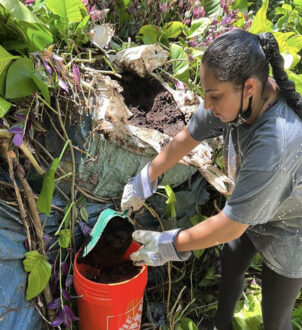GRIFFIN, Georgia – The Southern Sustainable Agriculture Research and Education Grant program (SSARE) is giving young researchers an opportunity to learn more about sustainable agriculture.
Through the James Harrison Hill, Sr. Young Scholar Enhancement Grant program, high school and undergraduate students are working alongside researchers on SSARE-funded projects, ranging from pollinators to nutrient management to cover crops. Over $19,000 was funded for 2022 through the Young Scholar Enhancement Grant program to introduce students to STEM and social science activities related to sustainable agriculture.
The program was launched in 2013. Since then, 40 projects totaling $156,682 have been awarded to academic institutions throughout the region.
2022 grant projects include:
LS21-354 Efficacy of Cyanobacteria Biofertilizer and Two Other Common Organic Nutrient Sources for Snap Bean, Florida International University
LS20-342 Enhancing Hedgerow Systems in Fruit Tree Production to Improve Beneficial Insect Diversity and Abundance, University of Florida
LS20-341 Linking Pollinators, Resources and Soil Health in Working Farms, Texas Tech University
LS20-335 Cover Crops, Soil Water Movement, and Crop Growth: An integrated approach, Middle Tennessee State University
LS19-317 Identifying Modifications to FORCAP for Using Sub-surface Applied Litter and Summer Annuals, University of Arkansas
Learn more about the student-driven research projects through their digital posters.
Research and Education Grant research recipients with open and on-going SSARE funded projects are qualified to apply for the James Harrison Hill, Sr. Young Scholar Enhancement Grant Program to hire high school or college students to participate in their research program.
Learn more about the Young Scholar Enhancement Grant Program.
Published by the Southern Region of the Sustainable Agriculture Research and Education (SARE) program. Funded by the USDA National Institute of Food and Agriculture (NIFA), Southern SARE operates under cooperative agreements with the University of Georgia, Fort Valley State University, and the Kerr Center for Sustainable Agriculture to offer competitive grants to advance sustainable agriculture in America's Southern region. This material is based upon work that is supported by the National Institute of Food and Agriculture, U.S. Department of Agriculture, through Southern Sustainable Agriculture Research and Education, under sub-award numbers: LS21-354, LS20-342, LS20-341, LS20-335, and LS19-317. USDA is an equal opportunity employer and service provider. Any opinions, findings, conclusions, or recommendations expressed in this publication are those of the author(s) and do not necessarily reflect the view of the U.S. Department of Agriculture.
